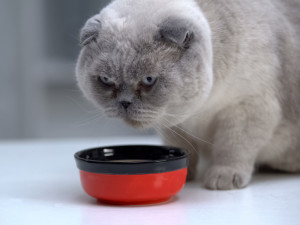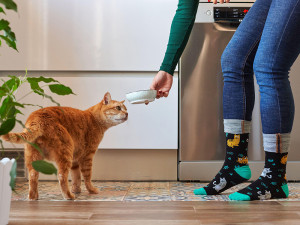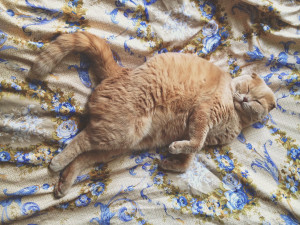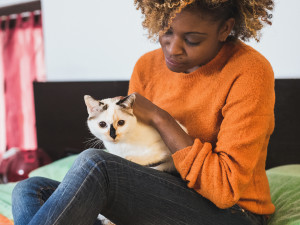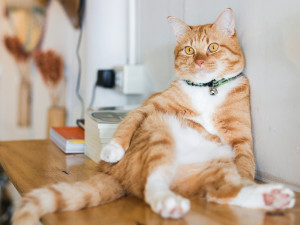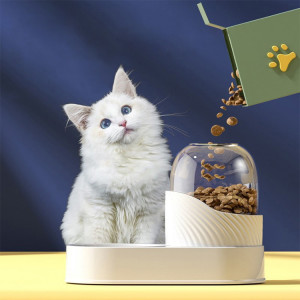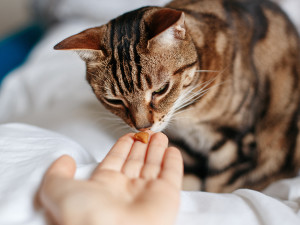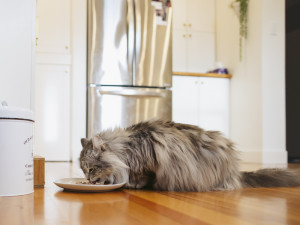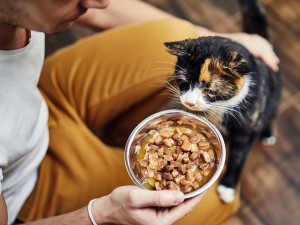Everything You Need to Know About Freeze-Dried Cat Food
This diet could be just right for your cat. But keep these things in mind before you make the switch.
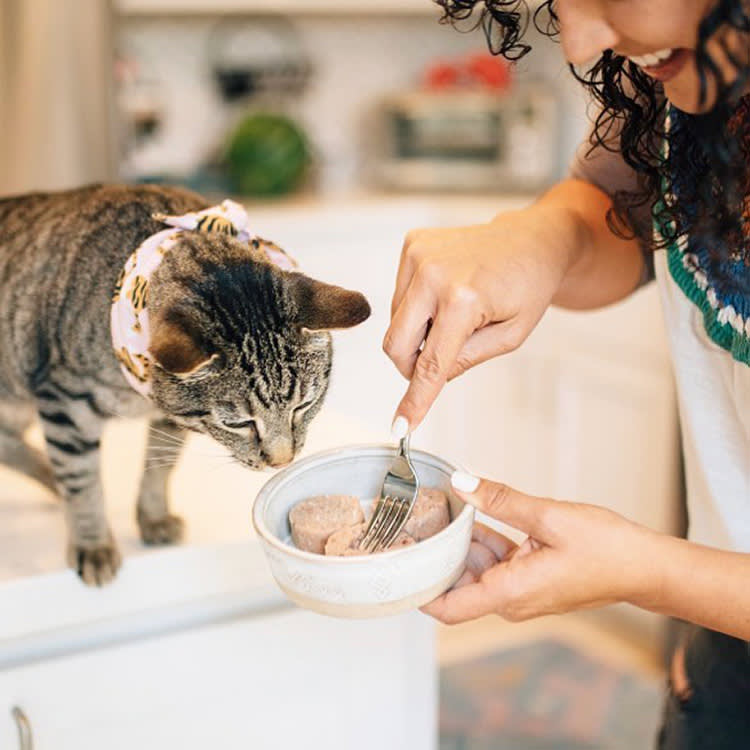
Share Article
Cats can be such finicky eaters, and just when you’re ready to do a happy dance that you found the food your cat loves, your cat will inevitably snub your thoughtfully curated buffet. So, it is no surprise that there has been an explosion of different cat foods on the market, all vying for your cat’s affection. In recent years, freeze-dried diets have gained popularity among some cats and their parents, and many new boutique-style products have popped up. Almost all of these diets are freeze-dried raw diets.
Some veterinarians do not recommend raw-food diets for this reason. The main concern is that raw diets contain raw meat, which carries a high risk of contamination from bacteria and parasites that would otherwise be killed in the heating and cooking process. The freeze-drying process does not kill opens in new tab that harmful bacteria. This puts both cats and their human family members at risk for certain food-borne infections from eating and/or handling these foods, especially Salmonella, E.coli, and toxoplasmosis. It can be dangerous for cats or people who have weakened immune systems due to certain illnesses or certain medications, and/or for those who are very young or elderly. Please make sure to wash your hands thoroughly as you handle this food.
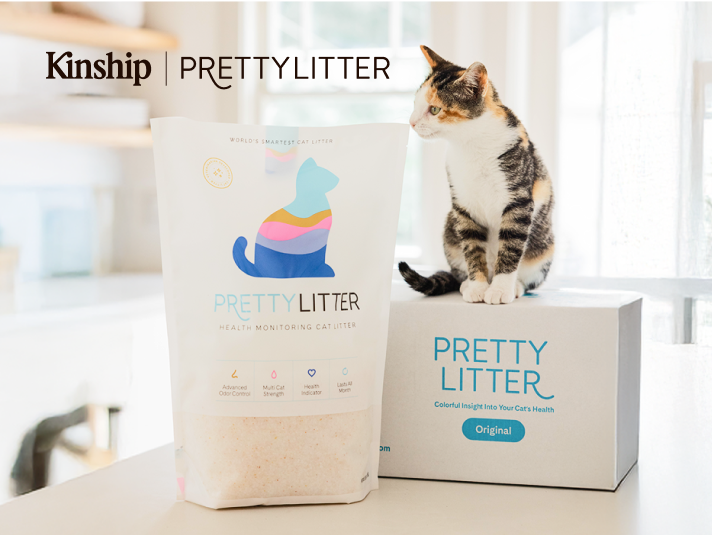
Save on the litter with color-changing tech that helps you better care for your cat.
On the other hand, if you speak with a cat parent who feeds their kitty a raw-food diet, you will often hear amazing claims of benefits including shinier coats, resolution of skin problems and digestive problems, improved appetite, and smaller, firmer, less-stinky poops — and who doesn’t want that? The problem is that none of these claims have been verified with published scientific studies, so it is hard to know what is true and what is hype. If you are considering a freeze-dried diet, here’s what you need to know.
What Is the Nutritional Value of Freeze-Dried Cat Food?
Freeze-dried diets do not have specific ingredients or nutritional values; the “freeze-dried” label simply tells you the method used to process and preserve the food. It is very important to check out the ingredient list as well as the labeling on the food. Some freeze-dried foods are intended to be fed only as a treat or supplement because they are not balanced to provide all of a cat’s required nutrients.
Only diets that include a statement on the label that says they meet Association of American Feed Control Officials opens in new tab(AAFCO)’s standards for “complete and balanced nutrition” are safe to use as your cat’s everyday diet. Some foods may claim to be a whole diet, but if they don’t include that AAFCO statement, beware. Cats have unique nutritional needs, and if they eat a diet that is not properly balanced, they can suffer serious health consequences.
How Do You Which Brands Are Best?
When it comes to freeze-dried raw diets, there are a few important things to look for to ensure food is healthy and safe for your cat. Always check that the label has the above-mentioned note from the AAFCO. It is also important to look for brands that are vigilant about reducing the risk of bacterial and parasitic contamination. An effective way to do this is with an additional treatment process called high-pressure processingopens in new tab.
This technique uses high pressure without heat to kill bacteria and parasites. It is not 100 percent effective, but it dramatically reduces the risk of infections from raw food. The most proactive brands also test each batch of food for bacteria and parasites to make sure nothing contaminated reaches the consumer. These two additional steps help to make freeze-dried raw diets much safer for both cats and their human family members.
Other Factors to Consider With Freeze-Dried Diets
Whenever you are considering a diet change, especially to a raw-food diet, it is a good idea to consult with your veterinarian. Some cats need specific diets due to their medical conditions and may need to avoid certain kinds of foods.
Raw-food diets, even those treated with high-pressure processing, should always be handled carefully as you would any raw meat product. This means washing your hands thoroughly after touching it, washing all bowls and utensils in hot, soapy water after preparing and feeding your cat, and making sure other people — especially children — do not accidentally handle or ingest it. Raw food diets should not be left out at room temperature for long periods of time once rehydrated. Make sure to pick up any leftover food and clean out your cat’s bowl right after feeding time.
While our cats are our babies, and we want to do anything and everything for their health and wellbeing, cost is also a consideration for many of us. Freeze dried-raw diets are expensive, especially the brands making the highest quality diets and taking all of the necessary safety precautions. It may not be a realistic option for every cat owner, and that is OK.
There are many excellent diets for cats at all price points, and diet is just one of many expenses you will take on as a cat parent. Make sure to put money aside, or consider these helpful resources, for unexpected health problems that may arise as well as routine care, such as annual check ups, vaccines, dental cleanings, and grooming. These all play major roles in the health of your cat, too. And of course, you want to have funds left in your cat budget for all the fun things, like cozy cat beds and catnip toys that give them wild zoomies.

Dr. Amy Fox, DVM
Amy Fox, DVM is a small animal veterinarian in New York City. A lifelong animal lover, Dr. Fox studied biology in college and then worked as a veterinary nurse before pursuing veterinary school at Cornell University. She has worked in many different settings including shelter medicine, emergency medicine, general practice, and animal cruelty and forensics. She is especially interested in nutrition, preventative medicine and care for senior pets. Dr. Fox also enjoys writing about veterinary medicine and teaching. In her free time she loves to cook, garden, and go for long runs.
Related articles
![Woman petting her cat]()
Don’t Come For Us, But Is Your Cat Overweight?
We love a chonky cat, but here’s what you should know.
![A fat cat lounging on a shelf.]()
How Tech Helps Cats Lose Weight
A study found that smart feeders and digital scales are successful tools in cat weight-loss programs.
![white cat having dry food added to its feeder]()
7 Automatic Pet Feeders That Will Make Every Meal an Event
Go ahead, make your morning routine a little easier.
![cat being offered a treat or vitamin]()
The Best Supplements and Vitamins for Cat Health
Not your mama’s multivitamin.
![A cat eating wet food from a dish in the kitchen.]()
8 Cat Meal Toppers for Finicky Eaters
Tips for improving your cat’s appetite with these tasty add-ons.
![Senior cat looking at a bowl of wet food while its owner kneels next to it and pets its back]()
Finally, the Reason Why Your Cat Is a Picky Eater
A new study reveals a quick fix for your senior cat’s loss of appetite.

